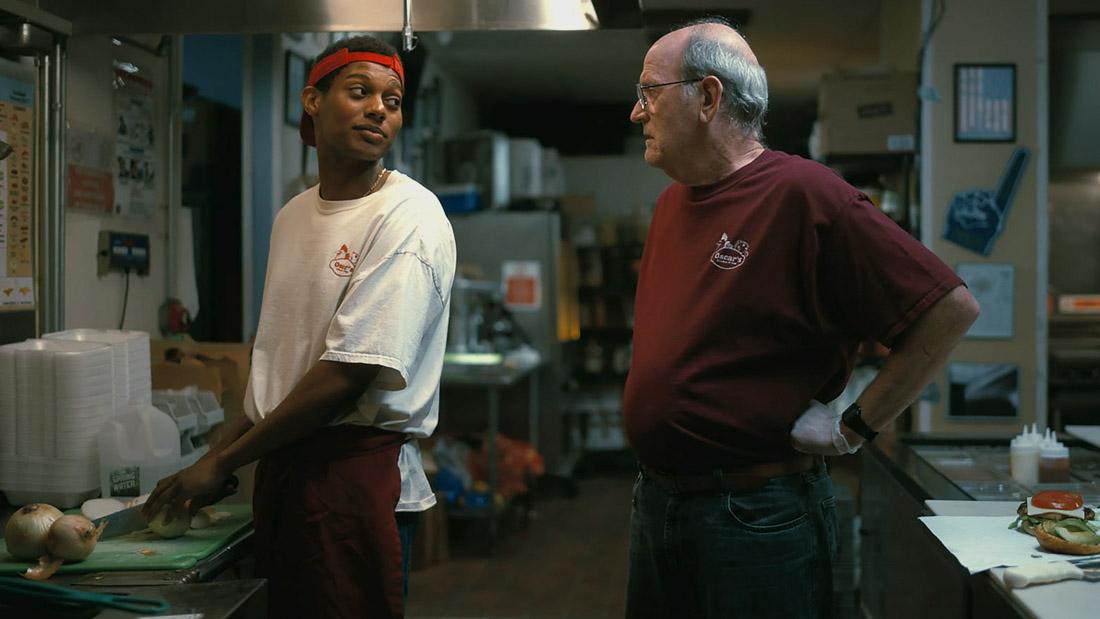Despite two outstanding leading performances and a handful of good points, the awkwardly on-the-nose drama The Last Shift remains so staunchly focused on delivering a bit of timely social commentary that it forgets to be a well rounded movie. It’s not that the messages at the heart of writer-director Andrew Cohn’s first fictional feature aren’t important or timely, but rather that they’re delivered in a manner that feels like a parent holding a child’s hand through a lecture. The Last Shift is the sort of social issue film that treats its audience not with contempt, but with a coddling tone that annoys much more than it enlightens.
A more appropriate title would be “The Last Four or Five Shifts,” as Cohn’s film follows a man on the wrong side of middle aged whose working days are coming to an end. Stanley (Richard Jenkins, who also appears in Miranda July’s Kajillionaire this week), has spent 38 years working the graveyard shift at Oscar’s Chicken and Fish, a regional fast food chain outpost in the small town of Albion, Michigan; a place our protagonist’s best friend (played by Ed O’Neill) rather charitably describes as “a shithole.” Stanley will soon be on his way to Sarasota, Florida to reunite with his elderly mother, so they can rent an apartment together. Stanley barely has enough to make the trip, and doesn’t even have the driver’s license (or car) he needs to drive down there. A lifer at his job, Stanley can’t leave until he trains his replacement, Jevon (Shane Paul McGhie), a young black man, aspiring writer, and father who has to prove gainful employment as part of his probation, following charges of vandalism and resisting arrest.
The Last Shift is one of those odd couple movies that tries to foster empathy through two ideologically opposed characters, and Cohn goes about things in the most simplistic ways possible. Stanley, a high school dropout, has spent most of his life ignoring real responsibility and genuinely believing that his menial job holds a lot of value. Jevon is strong, proud, and unafraid to say what’s on his mind regardless of how blunt it might sound, but he’s also just as much of a stunted adolescent as his duller, older, white counterpart. There are huge differences between the characters, but by the end it will turn out that they have more in common than they thought. If The Last Shift were a comedy, it would be one of those “white people talk like this… black people talk like this” gags.
That doesn’t mean everything about The Last Shift’s dodgy script is irredeemable. As it stands, Stanley and Jevon are well written characters, even if more attention and dramatic momentum is placed with the former. Jenkins does a fine job of playing Stanley as a “go along to get along” type, and even if the viewer knows a breaking point has to be coming, the performance doesn’t suffer as a result. Similarly, McGhie brings a lot of intelligence and wit to Jevon that nicely suits Cohn’s storytelling aims.Their chemistry almost singlehandedly elevates The Last Shift to a higher degree of respectability than the film earns.
The biggest problem with The Last Shift is Cohn’s desire to use his film as a soapbox for issues the filmmaker can’t quite grip. The Last Shift tries desperately and sometimes painfully to sound overly intelligent, leading to a script so overwritten that it betrays the everyman characters at the heart of it. Cohn’s script is so desperate to deliver a message about racial inequality that it forgets to make its characters speak and react like flesh and blood human beings. There are numerous moments where it sounds like Jevon is reciting magazine articles word for word, while the less intelligent and easily triggered Stanley sounds like the more reserved members of a comments section on the same article come to life. There’s even a queasily awkward subplot that revolves around a lynching in the town when Stanley was younger that feels needlessly tacked on and borderline exploitative when taken into context with the rest of the underdeveloped material. Such approaches might be to further illustrate the current American social divide, but it’s deeply corny and unconvincing. Jenkins and McGhie are doing their absolute best to try and make this work, but it has curiously little impact for something this passionately overwritten. Similarly, Cohn’s lack of any sort of directorial style makes the worst moments of his script come across like watching an overqualified cast working in a community theatre production.
Cohn makes some good points with his film – responsibility at work does not equate to social responsibility, corporations make millions on the backs of a workforce that they see as bottomless and exploitable – but The Last Shift is a well meaning misfire on the whole. Maybe if Cohn spent more time treating his characters like human beings instead of avatars for all of humanity, The Last Shift would resonate. The best moments of The Last Shift are ones where Stanley and Jevon are dealing with issues specifically relating to their own unique situations. Those moments on their own could coax these themes out into the open on their own. Instead, The Last Shift takes too many smoke breaks out back to spell things out for us.
The Last Shift opens in select theatres on Friday, September 25, 2020. If seeing a movie in cinemas, please take all necessary precautions. Practice social distancing, wear a mask, and stay home if feeling ill.
Join our list
Subscribe to our mailing list and get weekly updates on our latest contests, interviews, and reviews.

